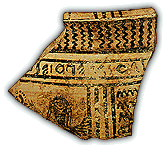




    |
|
|
|
The most ancient epigraphic testimonies are words inscribed informally on pottery. In these,  |  |
 | Proxeny decrees , conclusions of treaties, and laws were obviously written originally on perishable materials. The laws of Solon were recorded on kyrbeis, that is, whitewashed wooden tablets mounted on axles. In cases where special reasons required their preservation in time, public records were copied by carving them on stone or were engraved on metal. There is no doubt, however that these copies had comparable authority to, and in certain cases as in Athens, greater authority than, the original document on perishable material, which was obviously kept in an archive. |
At Athens more than anywhere else, public inscriptions were exposed to common view. This fact expressed democratic views, on the one hand, and a desire to have certain aspects of economic management under the god's control, on the other. Such was, for example, the role of the catalogues of dedications or tribute payments, and the accounts of building works on the Acropolis.
|
| |
|
Note: Click on a picture for a brief description. | |